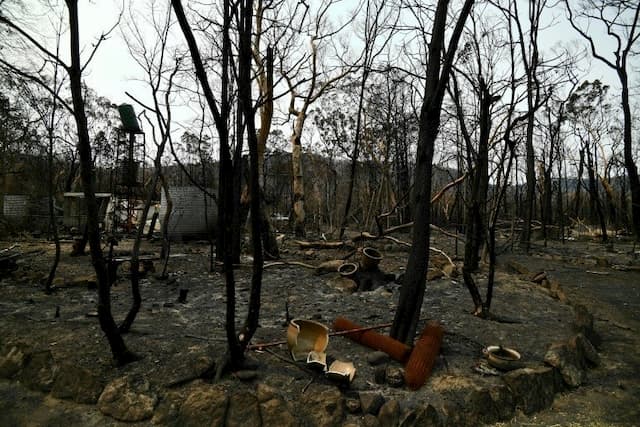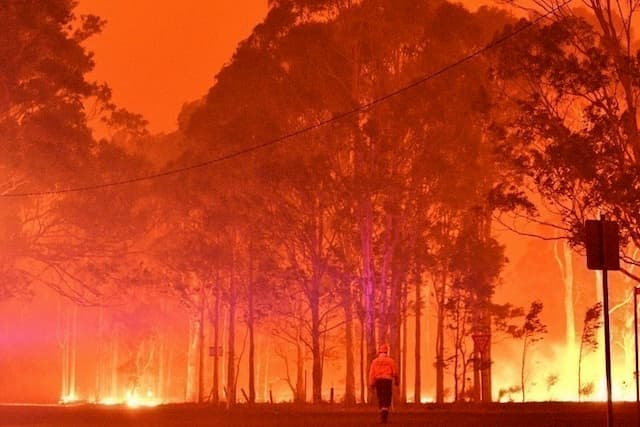Australia: After the Fires, Floods Ravage the East of the Country

Heavy rains hit southeast Australia, much to the relief of farmers. But this torrential rain turns out to be a double-edged sword.
In heavy rain fell on Friday, January 17, 2020 fire that ravaged eastern Australia, to the relief of some farmers who have already lost a significant part of their livestock and crops.
The rain has given a serious boost to the fire soldiers exhausted by months of fighting since September on the front of these unprecedented fires.
Rain expected in other regions
This weekend, certain regions located near the largest blaze should in turn experience significant precipitation.
Aggravated by global warming, this forest fire crisis, which has already killed 28 people, has been fueled by particularly hot and dry weather in recent months on the immense island continent.
They destroyed vast areas of virgin forest in eastern and southern Australia, wiped out livestock on farms and destroyed some 2,000 homes.

” We’re wishing for the best “
After a long period of drought and exceptional temperatures, the heaviest precipitation in almost ten years fell on Friday near certain regions bordering on the largest fires.
“In the past 24 hours, the rain has fallen over most of the fire-damaged areas, which is great news,” said the New South Wales rural fire department.
“We keep our fingers crossed that it will continue in the days to come “
However, the rain did not fall on all the fires that burn in New South Wales, nor on the State of Victoria where there are particularly virulent foci.

Devastated Kangaroo Island
Nor did it reach Kangaroo Island, a veritable sanctuary for exceptional flora and fauna, located to the south, off the coast of Adelaide.
The flames devastated the national park of this island, killing a large part of its population of koalas and threatening to completely eradicate certain endemic species of birds and marsupials.
Authorities have warned, however, that the crisis may worsen again, with Australia only in the middle of its summer.
Nevertheless, the prospect of wetter weather in eastern and southern Australia over the next few days still left hope.
Farmers at the edge
Fires and drought have pushed many farmers to the end, and this precipitation has put their heart at ease.
“What can I say, we are so lucky. Before that, the dams were dry and we transported water and food for months, “said AFP Stephanie Stewart, who operates in northern New South Wales.
“Now, we hope that it will spread and that it will ease the weight carried by so many other amazing farmers who have been and are still facing this dreaded drought.”
Over a billion animals killed
Scientists estimate that more than a billion animals are killed across Australian territory.
A large part of their habitats have been destroyed and environmental associations have warned of the risk of the extinction of certain species.
Koalas saved from the waves
The famous koalas focus a large part of the attention. Images showing these adorable little gray-furry beasts being saved from the hell of flames have hit the headlines around the world.
“Plein d’amour à nos copains australiens”: sur les réseaux sociaux, des images de forêts en flammes ou de koalas assoiffés font grimper les cagnottes d’aide après les gigantesques incendies https://t.co/azFVEPmKvb #AFP pic.twitter.com/2hiYCSLom7
— Agence France-Presse (@afpfr) January 18, 2020
But on Friday morning, some koalas and other animals from Australia’s reptile park on the east coast of New South Wales were rescued from the water.
“It’s amazing, just last week we had meetings every day on the imminent threat of forest fires,” said park manager Tim Faulkner
It’s just one thing after another for the animals of Australia. pic.twitter.com/ITinPbtoPV
— DW News (@dwnews) January 18, 2020
“Today, the whole team is on the ground, soaking wet, struggling to keep our animals safe and protect the park from the waves. We have not experienced such flooding in the park for more than 15 years, ”he said.
Flash floods
These torrential rains turn out to be a double-edged sword.
Water can indeed complicate the intervention of fire trucks forced to venture on muddy tracks deep in the forests, warned the authorities.
Flash floods also cause concern. Burning mountains cannot hold water and may throw mud currents into streams.
Such torrents are already responsible for the death of a considerable number of fish, poisoned by these muddy ashes, media reports said.
Enjoyed this? Get the week’s top France stories
One email every Sunday. Unsubscribe anytime.


